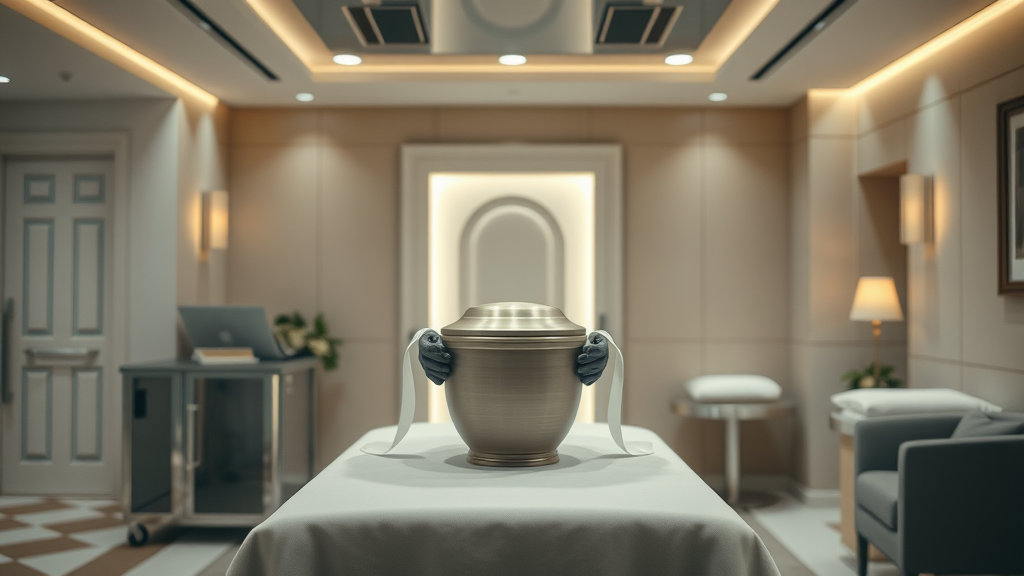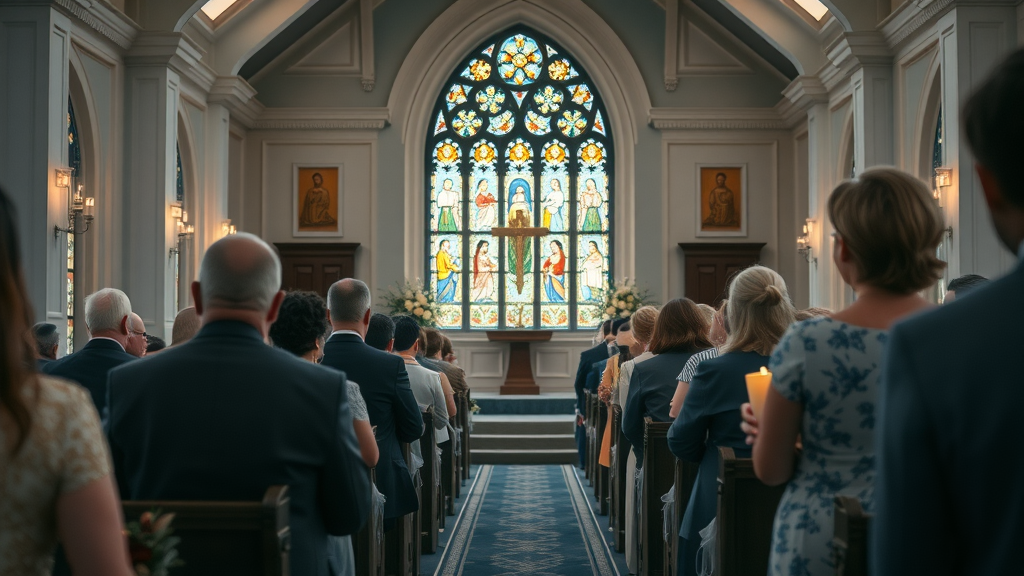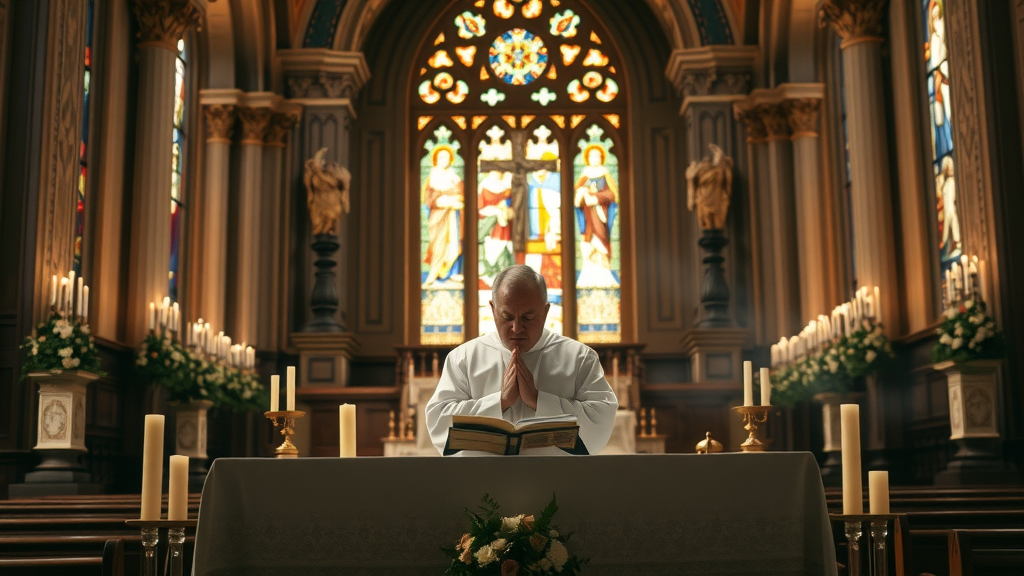Did you know that over 55% of Americans now choose cremation over traditional funerals? This surprising shift reflects changing family preferences, religious understandings, and financial considerations across the United States. Choosing between cremation versus funerals is no longer a simple tradition but involves personal, cultural, and economic factors. In this guide, you’ll uncover the untold facts, practical examples, and in-depth comparisons you need to make the best decision for yourself or a loved one.
Rethinking Final Arrangements: Surprising Facts About Cremation Versus Funerals
- Did you know over 55% of Americans now choose cremation over traditional funerals? Explore why the shift toward cremation versus funerals has accelerated and what it means for your choices.

In today’s world, more families are having open conversations about their final wishes. The unprecedented rise of cremation over traditional funerals in the United States is increasingly shaped by changing values, budget constraints, and the need for flexible memorials. People are discovering that cremation services offer personalization and simplicity, while classic funerals uphold long-standing rituals and emotional closure. Whether you’re drawn to the idea of a cremation process for its environmental benefits or seeking the comfort and structure of funeral services, understanding your options is critical. Let’s explore the core differences, practicalities, and heartfelt considerations shaping this important choice.
Cremation Versus Funerals: Understanding Each Option in Depth
The Cremation Process: How It Works and What to Expect
- Step-by-step overview of the cremation process
- Timeline from container selection to returning cremated remains
- Costs, personalization, and flexibility

The cremation process begins after death certification and typically takes place at a licensed crematorium or funeral home. The human body is respectfully prepared—removing medical devices as needed and placed in a suitable container. The cremation chamber, often constructed of heat-resistant materials, then receives the container, where intense heat reduces organic matter to ashes. This step takes place over a few hours, after which the remains are cooled and processed into a fine powder. The cremated remains are returned to the family in a basic urn, but families can opt for keepsake urns, jewelry, or scattering tubes depending on their wishes.
From start to finish, the cremation process allows families to forego elements like embalming or a viewing, but also provides opportunities for a memorable farewell. Some choose a direct cremation service with minimal ceremony, whereas others schedule services prior to or after cremation so family and friends can gather. Costs are generally lower than traditional funerals, and personalization can be as unique as the individual—whether through music, keepsakes, or outdoor scatterings. Flexibility in timing, setting, and budget makes the choice of cremation a growing trend across the United States.
As you consider the practicalities and emotional aspects of each option, it can be helpful to see how families have honored their loved ones in real-life situations. For additional guidance and inspiration, explore this resource on helping families honor their loved one to discover meaningful ways to celebrate a life, whether you choose cremation or a traditional funeral.
Traditional Funeral Services: Core Components and Customization
- Breakdown of a classic funeral service
- Order of Christian funerals and non-religious alternatives
- Viewing, ceremony, committal, and memorial options

A traditional funeral service is deeply rooted in history and ritual, often guided by religious or cultural customs. The ceremony typically commences at a funeral home or chapel, where the funeral director helps orchestrate events. For Christian funerals , elements may include scripture readings, hymns, prayers, and an eulogy, following the Order of Christian Funerals. Non-religious or secular services substitute spiritual elements with personal tributes, poetry, or music, ensuring the event remains meaningful and reflective.
Most funerals offer a structured progression: a public viewing for family and friends to pay last respects to the deceased, followed by the funeral service and a committal at the burial site. Some families opt for memorial services days or weeks later, especially when geographical distance is a factor. Today, more funeral homes allow customization—ranging from unique floral arrangements to themed events—offering a level of personalization once reserved for only the most affluent. Whether honoring tradition or creating a one-of-a-kind ceremony, the goal remains the same: supporting loved ones during the grieving process and providing closure.
Cremated Remains and Their Significance
- Choices for cremated remains: interment, scattering, keepsakes
- Emotional and cultural considerations when handling cremated remains
After the cremation process , families face the choice of how to honor and care for cremated remains . Options include interment in a cemetery, preserving ashes in a decorative or keepsake urn, or scattering in a location of special significance—often a favorite park, garden, or body of water. Some families choose to divide remains among loved ones using smaller urns or incorporate ashes into jewelry or memorial objects, turning memories into lasting keepsakes.
Handling cremated remains is a deeply personal decision influenced by cultural, religious, and emotional factors. For families who value a place for visitation and reflection, cemetery or columbarium placement provides a traditional sense of peace. Others find comfort in innovative alternatives, such as biodegradable urns or memorial forests, which offer a living tribute. Honoring the presence of cremated remains can also include memorial ceremonies or placing ashes alongside a loved one—each path tailored to reflect unique beliefs, traditions, and family bonds.
Cremation Versus Funerals: Comparing Costs With Transparency
| Service Component | Average Cremation Cost (USD) | Average Funeral Cost (USD) |
|---|---|---|
| Basic Service Fee | $2,000 | $2,500 |
| Cremation Process / Embalming | $250 | $750 |
| Urn / Casket | $100 - $500 | $2,000 - $5,000 |
| Viewing / Visitation | $0 - $500 (optional) | $400 - $1,000 |
| Ceremony / Venue | $500 | $500 |
| Grave / Columbarium Niche | $500 - $2,000 (optional) | $2,000 - $5,000 |
| Total Estimated Cost | $2,500 - $7,500 | $7,000 - $15,000 |
Transparency matters. The costs associated with cremation and funerals vary by region and provider, but on average, direct cremation is significantly more affordable than a full-service funeral. By eliminating embalming, expensive caskets, and often the need for a cemetery plot, cremation offers substantial savings without sacrificing the dignity of the farewell. However, families prioritizing traditional burial and ceremonies should budget for higher costs reflecting the complexity and duration of those services.
Religious and Cultural Insights: Christian Funerals and the Order of Christian Funerals
Navigating the Order of Christian Funerals
- What the order of Christian funerals involves
- Ceremonial sequences and scriptural themes

For many families, the order of Christian funerals holds deep spiritual significance. This liturgical sequence, established by Catholic and many Protestant denominations, consists of a wake (or vigil), funeral mass or liturgy, and committal. Led by a priest or minister, the ceremony draws from scripture, prayers for the deceased, hymns, and sometimes the celebration of the Eucharist. The rites are designed to affirm the belief in the resurrection, provide comfort, and guide mourners through a process of honoring life and embracing hope.
The order of Christian funerals can be adapted for different traditions. While some families opt for a full funeral mass with the body or presence of cremated remains , others may prefer a memorial service after cremation as the final disposition. Funeral directors and clergy work closely with the family to balance religious customs, personal wishes, and logistical requirements, ensuring every detail is meaningful and appropriate to the beliefs of the deceased and their loved ones.
How Cremation Aligns With Christian and Other Faith Perspectives
"The Catholic Church now permits cremation, provided it is not chosen for reasons contrary to Christian doctrine." – United States Conference of Catholic Bishops
Historically, cremation was considered incompatible with Christian burial traditions due to theological concerns about resurrection. However, today, the vast majority of Christian denominations, including the Catholic Church, recognize cremation as a valid choice, so long as the motives respect the dignity of the deceased and traditional Christian beliefs. Protestant, Orthodox, and non-denominational churches increasingly support cremation, provided funeral rites are observed and the remains are treated respectfully.
Other faiths, including Judaism, Islam, and certain Eastern religions, have varying stances on cremation and burial. The key is understanding how religious values and cultural traditions intersect with personal preference. Before choosing cremation, families are encouraged to consult their spiritual advisors and funeral homes experienced with both the cremation process and religious observance, ensuring a farewell that honors faith and fulfills the wishes of the deceased.
Key Benefits and Drawbacks: Cremation Versus Funerals
- Environmental Impact: Cremation generally has a smaller environmental footprint than traditional burial, as it eliminates the need for embalming chemicals and cemetery land. Green cremation and funeral alternatives are now on the rise.
- Flexibility and Personalization: Cremation services are highly flexible—allowing families to choose timing, location, and format of memorial events. Traditional funerals offer structured rituals that many find comforting.
- Time and Logistical Differences: Cremation can be arranged quickly when needed, while funerals often require more extensive planning and immediate decisions about burial. Logistics may include securing cemetery plots, transporting remains, and coordinating multiple events.
Watch our short expert interview video explaining key differences, costs, and cultural considerations when comparing cremation and funeral services.
While the choice between cremation versus funerals should be highly personal, understanding the pros and cons can clarify what suits your family best. Some find the environmental and financial benefits of cremation appealing, while others seek the closure and community presence that traditional funerals uniquely provide. Discuss options with a compassionate staff or funeral director to weigh every angle.
Cremation Service Personalization: Meaningful Memorial Choices
Unique Ideas for Celebrating a Life With Cremation or Funeral
- Innovative memorial services, keepsake urns, and eco-friendly tributes

Farewell ceremonies should feel as unique as the person they honor. Modern cremation services are now tailored to reflect every individual’s story—whether through outdoor celebrations, eco-conscious farewells, or keepsake mementos. Innovative ideas include scattering ashes at sea, planting a tree with cremated remains, or gathering for a memory walk with friends and family. Customized urns, memorial jewelry, and video tributes allow memories to live on.
Even with classic funerals, customization can include themed music, personal photos, or interactive guestbooks. Many funeral homes now offer webcasting for distant relatives, creating a sense of inclusion. Whether your family prefers the intimacy of a home service, the symbolism of a church, or an evocative natural setting, both cremation and funeral events can be personalized. Discuss your vision with your funeral director or compassionate staff to explore gallery-worthy options that inspire healing and togetherness.
People Also Ask: Your Top Cremation Versus Funerals Questions Answered
Can you still have a funeral if you're cremated?
- Absolutely. Many families choose a funeral or memorial service either before or after cremation. This allows for celebration of life and closure with cremation as the final disposition.
Yes, you can still hold a full funeral service even if cremation is chosen. The ceremony can take place with the human body present before the cremation or with the cremated remains afterward. This approach offers families flexibility to honor traditions, bring family and friends together, and create a deeply meaningful experience regardless of the final disposition.
How do funerals work when the person is cremated?
- Services can include a traditional ceremony with the body present, followed by cremation, or a memorial gathering with the cremated remains. Each option is customizable to family wishes.
Funeral services for someone who chooses cremation are highly adaptable. Sometimes, the funeral service takes place at the funeral home prior to cremation, allowing loved ones to pay respects. After the cremation process, a memorial event with the cremated remains present is another popular option. Funeral directors can guide families through planning, ensuring both practical and emotional needs are met.
What is the downside of cremation?
- Cons may include limitation on some traditional rites, potential for disagreement among family members, and emotional factors regarding loss of a grave for visitation.
While cremation offers great flexibility and affordability, it may have drawbacks. Some family members find it difficult to let go of the tradition of a gravesite for visitation or memorialization. There can also be disagreements about how to handle or distribute cremated remains . For those who value traditional rituals or require a permanent resting place, direct burial or structured funeral rites might be preferable.
What does the Bible say about cremation and burial?
- Biblical scripture doesn’t prohibit cremation. While burial has been the tradition, most Christian denominations now accept cremation as an option, emphasizing the importance of honoring the deceased’s wishes.
The Bible doesn’t directly oppose cremation. While Christian history favored burial to symbolize hope in the resurrection, modern doctrine in most denominations leaves the choice to the family. The key principle is respecting and honoring the deceased’s intentions, observing funeral rites, and providing a meaningful farewell through either method of final disposition.
Deciding Between Cremation Versus Funerals: How to Make the Right Choice
- Checklist of considerations: budget, faith, family traditions, environmental concerns, and personal wishes when weighing cremation service or funeral

When considering cremation versus funerals , weigh the following:
- Budget: Determine the best value for your loved one’s wishes and your family’s financial comfort.
- Faith and Cultural Traditions: Do religious beliefs or cultural customs specify burial or allow for cremation?
- Personal Preferences: Are you drawn toward a structured memorial, or do you prefer more flexibility and timing?
- Environmental Perspective: Are green or eco-friendly funeral alternatives or cremation options a priority?
- Family Dynamics: Consider the emotional needs and approvals from family members to ensure mutual respect and peace.
Real Voices: Reflections on Choosing Cremation Versus Funerals
"Cremation allowed us more time and options to celebrate my father’s life as he wished. It gave us peace of mind and flexibility our family valued." – Recent client testimonial
Every family’s journey is unique. Listening to experiences from others who have planned cremation and funeral services highlights the peace of mind, flexibility, and healing that comes from honoring personal wishes. Open dialogue with professional, compassionate staff allows families to craft a memorial that feels both comforting and distinctive.
Frequently Asked Questions About Cremation Versus Funerals
-
How do I begin planning a cremation service?
Start by selecting a reputable funeral home or cremation provider. Discuss your wishes, options for ceremonies, and services such as urn selection and memorial planning with a funeral director. -
What happens to cremated remains if unclaimed?
State and local laws guide the disposition of unclaimed cremated remains. Typically, providers hold remains for a specified time before respectfully transferring them to a communal memorial site or providing burial. -
Are there green or eco-friendly funeral alternatives?
Absolutely. Options range from biodegradable urns and green burials to natural burial preserves and water-based cremation, offering meaningful tributes while honoring the environment.
Your Path Forward: Connect With Our Cremation Service Experts
- Speak with a compassionate advisor to discuss cremation versus funerals, receive a custom quote, or schedule a personal consultation. Make a confident, well-informed farewell decision today.

Ready for answers? Our compassionate funeral director is here to help you navigate cremation services and traditional funeral options. Reach out today for a personalized consultation—so you and your family can make memories and say goodbye with confidence and dignity.
If you’re seeking a deeper understanding of how families navigate the emotional journey of honoring loved ones, consider broadening your perspective with stories and expert advice on helping families honor their loved one . For those interested in holistic approaches to well-being and support during times of transition, you may also find value in exploring the benefits of Mia's Healing Hands , which offers insights into compassionate care and healing practices. Taking the next step in your planning journey can empower you with knowledge, comfort, and a sense of peace as you honor your loved one’s legacy.
When considering end-of-life arrangements, understanding the differences between cremation and traditional funerals is essential. The article “Cremation vs Burial: A Comparison Guide” provides a comprehensive overview, highlighting factors such as cost, environmental impact, and personal preferences to assist in making an informed decision. ( afterall.com ) Additionally, “Traditional Funeral vs. Cremation: Which Is Right for You?” delves into the emotional and cultural aspects of each option, offering insights into how they align with individual beliefs and family traditions. ( renidy.com ) Exploring these resources can help you navigate the complexities of farewell planning, ensuring choices that honor your values and the wishes of your loved ones.
 Add Row
Add Row 

 Add
Add 


Write A Comment